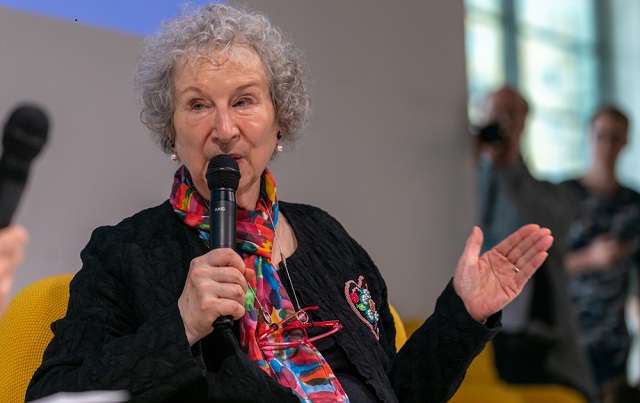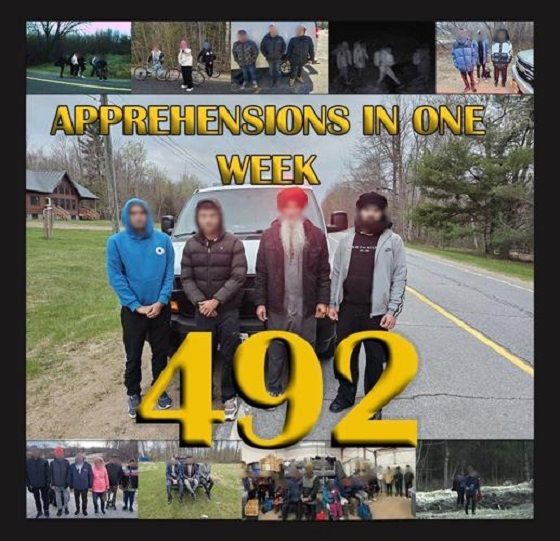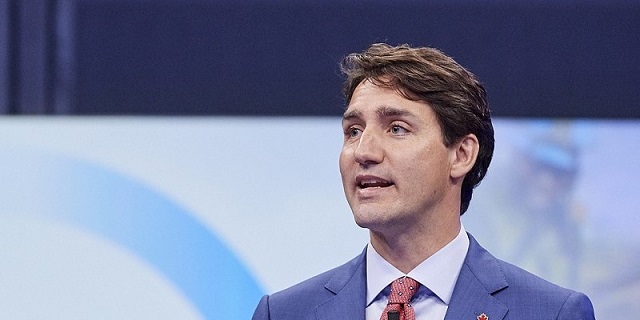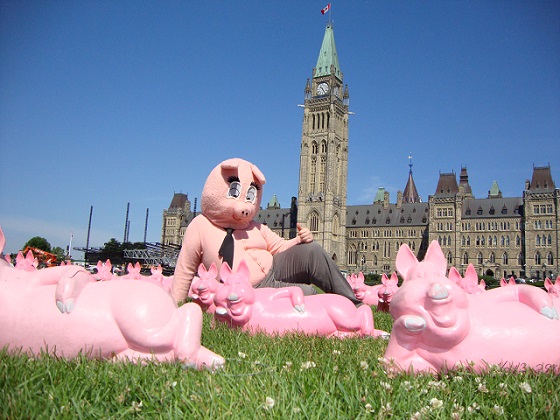Censorship Industrial Complex
Margaret Atwood compares Trudeau’s proposed Online Harms Act to Orwell’s ‘1984’

From LifeSiteNews
According to the proposed legislation, the bill would not only punish those who committed a “hate crime” but also those suspected of committing one in the future.
Liberal Attorney General and Justice Minister Arif Virani defended the Online Harms bill after Canadian author Margaret Atwood compared it to George Orwell’s dystopian novel Nineteen Eighty-Four.
On March 12, Virani claimed Atwood, famous for writing The Handmaid’s Tale, misunderstood the Online Harms Act, after the left-leaning author warned it would punish Canadians for “thoughtcrime,” comparing the legislation to laws introduced by totalitarian regimes such as the corrupt French aristocracy and the Soviet Union.
“If this account of the bill is true, it’s Lettres de Cachet all over again,” Atwood wrote on X, formerly known as Twitter, referring to secret letters sent by the King of France authorizing citizens to be imprisoned without a trial.
“The possibilities for revenge false accusations + thoughtcrime stuff are sooo inviting!” she added sarcastically. “Trudeau’s Orwellian online harms bill.”
If this account of the bill is true, it’s Lettres de Cachet all over again. The possibilities for revenge false accusations + thoughtcrime stuff are sooo inviting! Trudeau’s Orwellian online harms bill https://t.co/GziivgfNGt
— Margaret E Atwood (@MargaretAtwood) March 9, 2024
Atwood’s comment came in response to an article by The Spectator which warned the bill could lead to “thought police” regulating Canadians similar to those in George Orwell’s dystopian novel Nineteen Eighty-Four.
The often-referenced book is a cautionary novel about a totalitarian socialist society which punished its citizens if they disagreed their government’s agenda even in their thoughts.
While Atwood is known to be left-leaning, this is not the first time she called out Prime Minister Justin Trudeau for restricting freedom of speech. In April 2023, Atwood cautioned against Trudeau’s internet censorship legislation Bill C-11, comparing it to censorship in the Soviet Union.
Following Atwood’s comments online, Virani quickly attempted to reassure Canadians that she had just misunderstood the legislation, explaining that the bill’s definition of “hate speech” does not include what is “awful but lawful.”
“It includes expressions of detestation and vilification. It does not include insults, offensive comments, or jokes that are not very polite,” said Virani at a press conference in Toronto.
“The idea that someone on their smartphone on an afternoon while they’re watching a football game, if they insult anyone … could be condemned in a court or caught by a peace bond is ridiculous, in my opinion,” he added.
However, Virani conveniently neglected to say what would be considered “hate speech,” especially considering the bill regulates “posting hate speech online” that is deemed “discriminatory” against a wide range of “protected” categories, notably gender, race and sexuality.
Bill C-63, introduced last week, will create the Online Harms Act and modify existing laws, amending the Criminal Code as well as the Canadian Human Rights Act, in what the Liberals claim will target certain cases of internet content removal, notably those involving child sexual abuse and pornography.
However, the bill also seeks to punish “hate speech” and increase punishments for existing hate propaganda offenses in a substantial manner.
Penalties for violations of the proposed law include $20,000 fines and jail time, including life in prison for what it deems the most serious offenses.
According to the proposed legislation, the bill would not only punish those who committed a “hate crime” but also those suspected of committing one in the future.
“A person may, with the Attorney General’s consent, lay an information before a provincial court judge if the person fears on reasonable grounds that another person will commit; (a)an offence under section 318 or any of subsections 319(1) to (2.1); or (b) an offence under section 320.1001,” the text of the bill reads.
Atwood is not alone in her concerns over the legislation. Increasingly, prominent Canadians and even Americans have begun commenting on Trudeau’s authoritarian rule over Canada, particularly his restricting of internet speech.
Earlier this week, tech mogul Elon Musk called the proposed legislation “insane” as the new law would “allow judges to hand down life sentences for ‘speech crimes.’”
In late February, prominent Canadian anti-woke psychologist Jordan Peterson warned the new bill would undoubtedly lead to his criminalization.
Similarly, a top constitutional lawyer warned LifeSiteNews that the legislation will allow a yet-to-be-formed digital safety commission to conduct “secret commission hearings” against those found to have violated the law, raising “serious concerns for the freedom of expression” of Canadians online.
Additionally, Campaign Life Coalition recently warned that Bill C-63 will stifle free speech and crush pro-life activism.
Censorship Industrial Complex
Quebec court greenlights class action suit against YouTube’s COVID-related content censorship
From LifeSiteNews
The lawsuit, led by video blogger Éloïse Boies, argues YouTube violated freedom of expression under the Charter of Human Rights and Freedoms by censoring COVID-related content.
A class action lawsuit against YouTube’s censorship of COVID-era speech on the platform has been allowed to proceed in Canada.
The primary plaintiff in the case which has now been greenlit by the Quebec Superior Court is YouTuber Éloïse Boies, while the filing accuses the Google video platform of censoring information about vaccines, the pandemic, and the virus itself.
A copy of the order can be found HERE.
READ: Elon Musk skewers Trudeau gov’t Online Harms bill as ‘insane’ for targeting speech retroactively
Boies, who runs the “Élo Wants to Know” channel, states in the lawsuit that three of her videos got removed by YouTube (one of the censored videos was about… censorship) for allegedly violating the website’s policies around medical disinformation and contradicting World Health Organization and local health authorities’ COVID narratives of the time.
However, the content creator claims that the decisions represented unlawful and intentional suppression of free expression. In February, Boies revealed that in addition to having videos deleted, the censorship also branded her an “antivaxxer” and a “conspiracy theorist,” causing her to lose contracts.
The filing cites the Charter of Human Rights and Freedoms as the document YouTube violated, while the class-action status of the lawsuit stems from it including any individual or legal entity in Quebec whose videos dealing with COVID got censored, or who were prevented from watching such videos, starting in mid-March 2020 and onward.
Google, on the other hand, argues that it is under no obligation to respect the Charter of Human Rights and Freedoms, and can therefore not be held accountable for decisions to censor content it doesn’t approve of – or as the giant phrased it, provide space for videos “regardless of their content.”
But when Superior Court Judge Lukasz Granosik announced his decision, he noted that freedom of expression “does not only mean freedom of speech, but also freedom of publication and freedom of creation.”
Stressing the importance that Canada’s Supreme Court assigns to guaranteed freedom of expression as a key building block in a democratic society, the judge concluded that “If (Google) carries out censorship by preventing certain people from posting videos and prevents other people from viewing these same videos, it thus hinders the free circulation of ideas and exposes itself to having to defend its ways of doing things.”
Google was ordered to stop censoring content because it contradicts health authorities, WHO, or governments, pay $1,000 in compensation, and $1,000 in punitive damages to each of the lawsuit’s plaintiffs, as well as “additional compensation provided for by law since the filing of the request for authorization to take collective action, as per the court’s decision.”
As for those who were prevented from accessing content, the decision on damages will be the subject of a future hearing.
Reprinted with permission from Reclaim The Net.
Censorship Industrial Complex
Elon Musk skewers Trudeau gov’t Online Harms bill as ‘insane’ for targeting speech retroactively

From LifeSiteNews
It literally spits in the face of all Western legal traditions, especially the one about only being punished if you infringed on a law that was valid at the time of committing a crime
Billionaire tech mogul Elon Musk remarked that it is “insane” that the Trudeau government’s proposed “Online Harms” bill would target internet speech retroactively if it becomes law.
“This sounds insane if accurate!” wrote Musk on Tuesday, in reply to an X (formerly Twitter) user named Camus who detailed that Prime Minister Justin Trudeau’s government’s Bill C-63, the Online Harms Act, could see Canadians fined or even jailed for things posted on the internet prior to the bill becoming law.
Camus noted how Bill C-63 could give police “the power to retroactively search the Internet for ‘hate speech’ violations and arrest offenders, even if the offence occurred before the law existed.”
A brief time later, X’s “CommunityNotes” program – a system in which users collectively “fact-check” information shared on the site –confirmed what Camus had written was accurate, quoting a section of the bill’s text.
“Part 3 of Bill C-63, which is still at first reading stage and is not yet law, adds to the Canadian Human Rights Act: ‘a person communicates or causes to be communicated hate speech so long as the hate speech remains public and the person can remove or block access to it,’” CommunityNotes wrote.
Camus observed about Bill C-63 that the “Trudeau regime has introduced an Orwellian new law.”
“This new bill is aimed at safeguarding the masses from so-called ‘hate speech,’” he wrote. “The real shocker in this bill is the alarming retroactive aspect. Essentially, whatever you’ve said in the past can now be weaponized against you by today’s draconian standards.”
Camus observed how historian Dr. Muriel Blaive has weighed in on “this draconian law,” labeling it outright “mad.”
“She points out how it literally spits in the face of all Western legal traditions, especially the one about only being punished if you infringed on a law that was valid at the time of committing a crime,” wrote Camus.
Bill C-63 was introduced by Liberal Minster Attorney General Arif Virani on February 26 and was immediately blasted by constitutional experts as troublesome.
The bill, if passed, will modify existing laws, amend the Criminal Code as well as the Canadian Human Rights Act, in what the Liberals claim will target certain cases of internet content removal, notably those involving child sexual abuse and pornography.
However, the bill also seeks to police “hate” speech online with broad definitions, severe penalties, and dubious tactics.
Trudeau’s new bill a ‘terrible attack’ on speech, Musk warns
On Tuesday, well-known Canadian psychologist Jordan Peterson replied to Musk by saying about Bill C-63, “It’s much much worse than you have been informed: plans to shackle Canadians electronically if accusers fear a ‘hate crime’ might (might) be committed.”
“It’s the most Orwellian piece of legislation ever promoted in the West.”
Musk replied to Peterson by saying Bill C-63 is “[a] terrible attack on the rights of Canadians to speak freely!”
Other notable X users, such as Canadian lawyer David Freiheit, who is known online as Viva Frei, confirmed Musk’s concern that Bill C-63 could go after X users from posts/tweets made long ago.
“It’s pretty close to accurate, Elon. If someone has the ability to delete a ‘hate speech’ tweet / post and does not, and someone else retweets that tweet, it would qualify as ‘publication’ under the law and be sanctionable,” he wrote.
Details of the new legislation to regulate the internet show the bill could lead to more people jailed for life for “hate crimes” or fined $50,000 and jailed for posts that the government defines as “hate speech” based on gender, race, or other categories.
The bill also calls for the creation of a digital safety commission, a digital safety ombudsperson, and a digital safety office.
The Justice Centre for Constitutional Freedoms (JCCF) has said Bill C-63 is “the most serious threat to free expression in Canada in generations. This terrible federal legislation, Bill C -63, would empower the Canadian Human Rights Commission to prosecute Canadians over non-criminal hate speech.”
In a recent podcast, Peterson and Queen’s University law professor Bruce Pardy warned of the “totalitarian” impact Trudeau’s new Online Harms bill will have on Canada.
Peterson observed that the Trudeau government is effectively “establishing an entirely new bureaucracy” with an “unspecified range of power with non-specific purview that purports to protect children from online exploitation” but has the possibility of turning itself into an internet “policing state.”
-

 COVID-1919 hours ago
COVID-1919 hours agoKenyan doctor: WHO pandemic treaty aims to ‘maim and kill’ and ‘establish a one-world government’
-

 Agriculture2 days ago
Agriculture2 days agoFarming group accuses Canadian gov’t of trying to blame agriculture for ‘climate change’
-

 illegal immigration1 day ago
illegal immigration1 day agoNorthern border apprehensions highest in US history first 6 months of fiscal ’24
-

 illegal immigration1 day ago
illegal immigration1 day agoTerrorist watch list apprehensions at northern border continue to break records
-

 espionage1 day ago
espionage1 day agoEXCLUSIVE: House Committee To Investigate Spike In Chinese Illegal Immigration Following DCNF Report
-

 Automotive16 hours ago
Automotive16 hours agoElectric vehicle mandates mean misery all around
-

 Censorship Industrial Complex1 day ago
Censorship Industrial Complex1 day agoQuebec court greenlights class action suit against YouTube’s COVID-related content censorship
-

 Crime2 days ago
Crime2 days agoDEA doubtful of cartel order to stop fentanyl production








